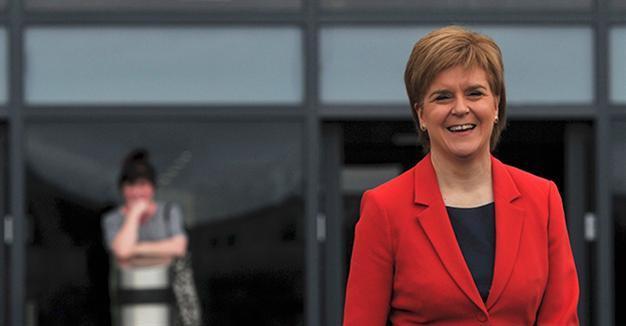UK that Scotland voted to stay in ‘does not exist anymore’: Sturgeon
LONDON

The Britain that Scotland voted to stay a part of in a 2014 referendum “does not exist anymore,” Scottish First Minister Nicola Sturgeon said on June 26 following Britain’s vote to leave the European Union (EU).
“The U.K. that Scotland voted to stay in in 2014 does not exist anymore,” Sturgeon told the BBC’s Andrew Marr Show after saying a second independence referendum was now “highly likely,” AFP reported.
“This is not going to be a re-run of the 2014 referendum. The context and the circumstances have changed dramatically,” she said.
Scots voted by 55 percent to 45 percent to stay in the United Kingdom in the 2014 vote, whereas the general outcome of the referendum stood at 52 percent for “Leave” and 48 percent for “Remain.”
But a Panelbase survey for the Sunday Times found 52 percent of respondents now wanted to break with the rest of Britain, while 48 percent were opposed.
“What’s going to happen with the U.K. is that there are going to be deeply damaging and painful consequences... I want to try and protect Scotland from that,” Sturgeon said.
Asked what Scotland’s negotiating position with Brussels could be and whether it would have to join as a new member state, Sturgeon said: “This would not be a decision about Scotland leaving... this would actually be a decision about Scotland staying.”
“Our argument is that we don’t want to leave. It’s not that we want to leave and get back in,” she said, adding she would speak to people in Brussels over the next few days.
At least 2.5 mln signs for repeat of EU referendum Meanwhile, more than 2.5 million Britons and U.K residents had signed a petition calling for a second vote by midday June 26, forcing lawmakers to at least consider a debate on the issue.
The U.K. Parliament has to consider a debate on any petition posted on its website that attracts more than 100,000 signatures.
The proposal, posted before the June 23 referendum, said the government should hold another plebiscite on EU membership if the support for Leave or Remain in a referendum was less than 60 percent in a turnout of under 75 percent of eligible voters.
The turnout of the vote was 72 percent.
The European Parliament’s chief called June 26 for British Prime Minister David Cameron to begin formal proceedings to leave the EU at a summit this week.
EP President Martin Schulz told German newspaper Bild am Sonntag that a period of limbo over Brexit would “lead to even more insecurity and thus endanger jobs.”
“Hesitating simply to accommodate the party tactics of the British conservatives hurts everyone,” he said.
“That is why we expect the British government to now deliver. The summit on Tuesday [June 28] is the right time.”
Ministers of the six original EU members - Germany, France, Italy, the Netherlands, Belgium and Luxembourg - held an emergency meeting June 25 to grapple with the first defection in the bloc’s 60-year history.
“We join together in saying that this process must begin as soon as possible so we don’t end up in an extended limbo period,” said German Foreign Minister Frank-Walter Steinmeier after the meeting in Berlin.
France’s Jean-Marc Ayrault directly urged Cameron to go quickly, telling AFP: “A new prime minister must be designated, that will take a few days but there is a certain urgency.”
Merkel more cautious On the other hand, German Chancellor Angela Merkel sought on June 25 to temper pressure from Paris, Brussels and her own government to force Britain into negotiating a quick divorce from the EU, despite warnings that hesitation will let populism take hold.
“Quite honestly, it should not take ages, that is true, but I would not fight now for a short time frame,” Merkel told a news conference.
“The negotiations must take place in a businesslike, good climate,” she said. “Britain will remain a close partner, with which we are linked economically.”
Meanwhile, U.S. Secretary of State John Kerry was scheduled to fly to Brussels and London on June 27 for talks with Washington’s key allies in the aftermath of Britain’s vote to leave the European Union.
U.S. officials travelling to Rome with the secretary of state told reporters on the flight that two stops had been added to his European itinerary at the last moment.
“Tomorrow we’ll go to Brussels and then on to London,” one official said.
Kerry arrived in Rome on June 26 on a planned visit to have lunch with Foreign Minister Paolo Gentiloni and a working dinner with Israeli Prime Minister Benjamin Netanyahu.
But officials on his flight said that on June 27 he would fly on to the EU headquarters in Brussels for crisis talks with EU foreign policy chief Federica Mogherini.
From Brussels Kerry will continue to London to see Foreign Secretary Philip Hammond and other officials from outgoing Cameron’s government.
 The Britain that Scotland voted to stay a part of in a 2014 referendum “does not exist anymore,” Scottish First Minister Nicola Sturgeon said on June 26 following Britain’s vote to leave the European Union (EU).
The Britain that Scotland voted to stay a part of in a 2014 referendum “does not exist anymore,” Scottish First Minister Nicola Sturgeon said on June 26 following Britain’s vote to leave the European Union (EU).